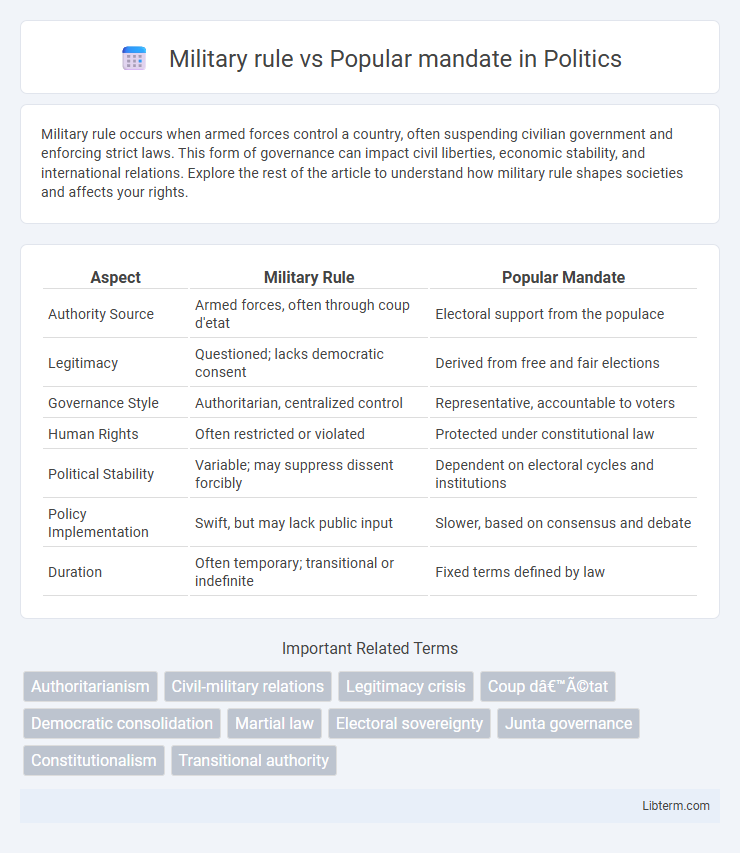Military rule occurs when armed forces control a country, often suspending civilian government and enforcing strict laws. This form of governance can impact civil liberties, economic stability, and international relations. Explore the rest of the article to understand how military rule shapes societies and affects your rights.
Table of Comparison
| Aspect | Military Rule | Popular Mandate |
|---|---|---|
| Authority Source | Armed forces, often through coup d'etat | Electoral support from the populace |
| Legitimacy | Questioned; lacks democratic consent | Derived from free and fair elections |
| Governance Style | Authoritarian, centralized control | Representative, accountable to voters |
| Human Rights | Often restricted or violated | Protected under constitutional law |
| Political Stability | Variable; may suppress dissent forcibly | Dependent on electoral cycles and institutions |
| Policy Implementation | Swift, but may lack public input | Slower, based on consensus and debate |
| Duration | Often temporary; transitional or indefinite | Fixed terms defined by law |
Defining Military Rule and Popular Mandate
Military rule refers to a system of governance where the armed forces hold significant political power, often suspended or overriding civilian authority, enforcing policies through hierarchical command and control. A popular mandate signifies the authority granted to elected officials or governments by the electorate, reflecting the collective will and democratic choice of the population through free and fair elections. These contrasting governance models highlight the tension between authoritarian control and democratic legitimacy in political systems.
Historical Context of Military Governments
Military governments have historically emerged during periods of political instability, often justified by claims to restore order and national security after coups or during civil conflicts. These regimes typically suspend democratic processes, concentrating power within the military hierarchy, which contrasts sharply with governments established through popular mandate that derive legitimacy from free elections and citizen consent. In many cases, military rule has resulted in authoritarian control and restrictions on civil liberties, whereas popular mandates are associated with accountability and institutional checks and balances.
Roots and Rise of Popular Mandate
Popular mandate stems from democratic principles where citizens exercise their sovereign power through voting, contrasting sharply with military rule typically established via coups or authoritarian control. The roots of popular mandate trace back to historical movements advocating for political representation and accountability, growing significantly during the Enlightenment and post-colonial democratization waves. Rising popular mandates globally have led to strengthened democratic institutions, increased civil liberties, and challenges to military dominance in governance.
Legitimacy: Authority and Public Consent
Military rule often relies on authority derived from force and hierarchical control, which may lack broad public consent, undermining its legitimacy. Popular mandate is grounded in democratic processes where authority stems from the explicit consent of the governed through elections, enhancing its legitimacy. The key difference lies in the source of legitimacy: coercive power versus voluntary public endorsement.
Governance Structures and Decision-Making
Military rule centralizes governance structures by placing authority in the hands of military leaders, often bypassing democratic institutions and limiting civilian participation in decision-making processes. Popular mandate relies on elected representatives to shape governance frameworks, emphasizing transparency, accountability, and public consent in policy formulation. Decision-making under popular mandate typically involves pluralistic consultation and legislative deliberation, contrasting with the hierarchical and command-driven approach characteristic of military regimes.
Civil Liberties under Military Rule vs Popular Mandate
Civil liberties under military rule often face severe restrictions, including limits on freedom of speech, assembly, and press, as military regimes prioritize control and stability over individual rights. In contrast, governments operating under a popular mandate typically uphold constitutional protections for civil liberties, fostering democratic participation and accountability through elections. The erosion of civil liberties in military rule leads to repression and suppression of dissent, while popular mandates encourage a pluralistic society with legal safeguards for human rights.
Economic Impacts: Stability or Stagnation?
Military rule often provides short-term economic stability through centralized control and rapid decision-making but risks long-term stagnation due to suppressed private sector growth and limited political freedoms. Popular mandates promote sustainable economic development by encouraging inclusive policies, innovation, and foreign investment, although they may face challenges in policy consistency and short-term volatility. Countries under military regimes may experience initial fiscal discipline, yet democratic governance typically fosters better economic diversification and resilience over time.
International Perspectives and Diplomatic Relations
Military rule often undermines international legitimacy and can lead to sanctions, diplomatic isolation, and strained bilateral relations, as many countries prioritize democratic governance and human rights in their foreign policy frameworks. Popular mandates, rooted in electoral legitimacy, generally enhance a nation's diplomatic standing, enabling stronger multilateral cooperation and increased foreign investment due to perceived political stability and adherence to international norms. The dichotomy between military regimes and popularly elected governments significantly influences international recognition, development aid, and strategic alliances within global diplomatic networks.
Case Studies: Notable Examples Worldwide
Military rule in countries like Myanmar and Pakistan has often led to authoritarian regimes with limited civil liberties, contrasting sharply with popular mandates in democracies such as India and Brazil, where elected governments reflect public will through regular elections. Notable cases include Egypt's 2013 military coup ousting an elected president, juxtaposed with South Africa's post-apartheid democratic transition built on popular mandate and inclusive governance. These examples highlight the impacts of military interventions on political stability, human rights, and international legitimacy compared to governments formed through popular electoral processes.
Future Trends: Democracy at Crossroads
Military rule often undermines democratic institutions by restricting civil liberties and consolidating power, whereas popular mandates reflect electoral legitimacy and citizen participation in governance. Future trends indicate a complex landscape where hybrid regimes may emerge, blending authoritarian controls with limited democratic practices, challenging traditional definitions of democracy. The ongoing tension between military interventions and popular mandates raises critical questions about the durability of democratic governance in volatile political environments.
Military rule Infographic

 libterm.com
libterm.com